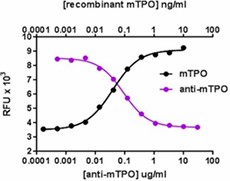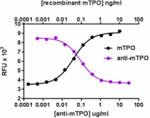- Clone
- A15138F (See other available formats)
- Regulatory Status
- RUO
- Other Names
- Megakaryocyte Colony Stimulating Factor (MKCSF), Myeloproliferative leukemia virus oncogene ligand (Mpl-ligand), Megakaryocyte growth and development factor (MGDF), THPO
- Isotype
- Rat IgG2b, κ
- Ave. Rating
- Submit a Review
- Product Citations
- publications

-

Recombinant mouse TPO induces proliferation of human megakaryocytic leukemic MO7e cells in a dose dependent manner (black circles). Anti-mouse TPO monoclonal antibody (clone A15139F, purple circles) neutralizes the proliferation of MO7e cells induced by recombinant mouse TPO (1 ng/ml). The ND50 = 0.04 – 0.2 µg/ml.
| Cat # | Size | Price | Quantity Check Availability | Save | ||
|---|---|---|---|---|---|---|
| 696103 | 100 µg | $270 | ||||
| 696104 | 1 mg | $715 | ||||
Mouse thrombopoietin (TPO) is a protein consisting of an N-terminus domain with homology to erythropoietin (EPO) and a C-terminus domain with multiple N-linked and O-linked glycosylation sites. TPO is a key regulator of megakaryocytopoiesis and thrombopoiesis. It signals through the c-mpl receptor and stimulates the proliferation and maturation of megakaryocytes, hence, TPO plays an important role in regulating the level of circulating platelets in vivo. It has also been shown that TPO is able to promote the survival, self-renewal, and expansion of hematopoietic stem cells and primitive multilineage progenitors. Besides its hematopoietic effects, TPO is expressed in the brain where it promotes the apoptosis of hypoxia sensitized neurons and inhibits neuronal differentiation by blocking NGF induced signaling.
Product DetailsProduct Details
- Verified Reactivity
- Mouse
- Antibody Type
- Monoclonal
- Host Species
- Rat
- Immunogen
- Recombinant mouse TPO
- Formulation
- 0.2 µm filtered in phosphate-buffered solution, pH 7.2, containing no preservative.
- Endotoxin Level
- Less than 0.01 EU/µg of the protein (< 0.001 ng/µg of the protein) as determined by the LAL test.
- Preparation
- The Ultra-LEAF™ (Low Endotoxin, Azide-Free) antibody was purified by affinity chromatography.
- Concentration
- The antibody is bottled at the concentration indicated on the vial, typically between 2 mg/mL and 3 mg/mL. Older lots may have also been bottled at 1 mg/mL. To obtain lot-specific concentration and expiration, please enter the lot number in our Certificate of Analysis online tool.
- Storage & Handling
- The antibody solution should be stored undiluted between 2°C and 8°C. This Ultra-LEAF™ solution contains no preservative; handle under aseptic conditions.
- Application
-
Neut - Quality tested
- Recommended Usage
-
Each lot of this antibody is quality control tested by neutralizing activity. The ND50 is 0.04 – 0.2 µg/mL. It is recommended that the reagent be titrated for optimal performance for each application.
- Product Citations
-
- RRID
-
AB_2687033 (BioLegend Cat. No. 696103)
AB_2687033 (BioLegend Cat. No. 696104)
Antigen Details
- Structure
- Monomer
- Distribution
-
TPO is produced by liver and kidney.
- Function
- TPO regulates megakaryocytopoiesis and thrombopoiesis.
- Interaction
- Megakaryocytes
- Ligand/Receptor
- TPO-R (MPL, CD110)
- Biology Area
- Apoptosis/Tumor Suppressors/Cell Death, Cell Biology
- Molecular Family
- Cytokines/Chemokines, Growth Factors
- Antigen References
-
1. Avanzi G, et al. 1988. Br. J. Haematol. 69:359.
2. Deutsch VR and Tomer A. 2006. Br. J. Haematol. 134:453.
3. Kaushansky K. 2005. J. Clin. Invest. 115:3339.
4. Li J, et al. 1999. Br. J. Haematol. 106:345.
5. Kato T, et al. 1997. Proc. Natl. Acad. Sci. 94:4669.
6. Ehrenreich H, et al. 2005. Proc. Natl. Acad. Sci. 102:862.
7. Sangkhae V, et al. 2014. Blood 124:3956. - Gene ID
- 22018 View all products for this Gene ID
- UniProt
- View information about Thrombopoietin on UniProt.org
Related Pages & Pathways
Pages
Related FAQs
- Do you guarantee that your antibodies are totally pathogen free?
-
BioLegend does not test for pathogens in-house aside from the GoInVivo™ product line. However, upon request, this can be tested on a custom basis with an outside, independent laboratory.
- Does BioLegend test each Ultra-LEAF™ antibody by functional assay?
-
No, BioLegend does not test Ultra-LEAF™ antibodies by functional assays unless otherwise indicated. Due to the possible complexities and variations of uses of biofunctional antibodies in different assays and because of the large product portfolio, BioLegend does not currently perform functional assays as a routine QC for the antibodies. However, we do provide references in which the antibodies were used for functional assays and we do perform QC to verify the specificity and quality of the antibody based on our strict specification criteria.
- Does BioLegend test each Ultra-LEAF™ antibody for potential pathogens?
-
No, BioLegend does not test for pathogens in-house unless otherwise indicated. However, we can recommend an outside vendor to perform this testing as needed.
- Have you tested this Ultra-LEAF™ antibody for in vivo or in vitro applications?
-
We don't test our antibodies for in vivo or in vitro applications unless otherwise indicated. Depending on the product, the TDS may describe literature supporting usage of a particular product for bioassay. It may be best to further consult the literature to find clone specific information.
Other Formats
View All Thrombopoietin Reagents Request Custom Conjugation| Description | Clone | Applications |
|---|---|---|
| Ultra-LEAF™ Purified anti-mouse Thrombopoietin (TPO) | A15138F | Neut |
Compare Data Across All Formats
This data display is provided for general comparisons between formats.
Your actual data may vary due to variations in samples, target cells, instruments and their settings, staining conditions, and other factors.
If you need assistance with selecting the best format contact our expert technical support team.
-
Ultra-LEAF™ Purified anti-mouse Thrombopoietin (TPO)

Recombinant mouse TPO induces proliferation of human megakar...

 Login/Register
Login/Register 








Follow Us